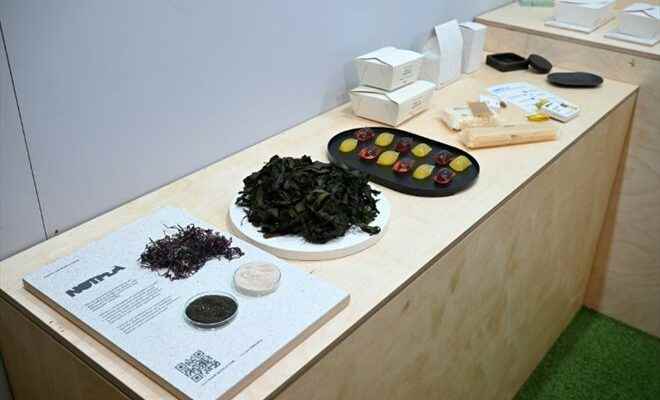The startup Notpla has created an edible packaging to encapsulate liquids and do without plastic bottles (AFP/Justin TALLIS)
How to avoid packaging drinks and food in plastic and thus reduce soil and ocean pollution? In London, a startup co-founded by a Frenchman has found a solution: edible or naturally biodegradable packaging, made from seaweed.
An idea that earned the startup Notpla this year to be selected among the fifteen finalists for the Earthshot prize, created by Prince William to reward innovations that are good for the environment or the fight against climate change.
Notpla’s adventure began in a small London kitchen. The French Pierre Paslier and the Spaniard Rodrigo Garcia Gonzalez, both students at the Royal College of Art in London to train in the design of innovative products, sought to create packaging that is not harmful to the environment.
“Packaging engineer at L’Oréal, I was developing plastic packaging solutions, shampoo bottles, cream jars, and quickly I realized that I wanted to work on solutions rather than creating more plastics that end up in the environment,” the 35-year-old Frenchman told AFP.
The two students are trying to design packaging from natural and biodegradable materials, unlike plastics from the petrochemical industry.
After testing different plants, “we found seaweed extracts, and we realized that we could create solutions that were very close to what we could find in nature, and even possibly edible” , remembers Pierre Paslier.
– Gelatinous texture –
The video where they present their packaging concept in the shape of an edible bubble, called Ooho, goes viral on the internet, arousing the interest of investors. In 2014, the two students founded Notpla, now in full expansion with more than 60 employees and on the verge of manufacturing its products on an industrial scale.
Their bubble wrap, the size of a large cherry tomato, created from seaweed extracts using a secret process, can encapsulate all kinds of liquids: water, cocktails for use during festivals, or energy drinks distributed for example in 2019 to runners of the London marathon.
In the mouth, its texture resembles a gelatinous candy.

Frenchman Pierre Paslier co-founded Notpla in London (AFP/Justin TALLIS)
It is in their offices located in a large hangar close to the Queen Elizabeth Olympic Park in London, that the production of the bubbles is done, that of the other products being subcontracted to manufacturers in Europe. The young team also has its laboratories there to develop new products, always based on seaweed.
It has, for example, developed a naturally biodegradable coating for take-out meal boxes, which serves to protect the packaging from grease or liquid food.
Notpla thus supplies the sector giant Just Eat in the United Kingdom and in five other European countries. Food sold during the Women’s European Football Cup Final at Wembley Stadium in London in July was packaged by Notpla.
– “Incredible assets” –
One of its latest innovations is transparent packaging for dry products, such as pasta.
Algae “have incredible assets”, explains Pierre Paslier. They “grow very quickly, some of the algae we use in our labs grow almost a meter a day. (…) On top of that, there is no need for any human activity to make them grow, no need to add drinking water or fertilizer,” he says.
And “algae have been there for billions of years, so wherever our packaging ends up, nature knows very well how to deconstruct and reuse these materials without creating pollution”, boasts the engineer.

Thanks to algae, the startup Notpla manufactures edible or naturally biodegradable packaging (AFP / Justin TALLIS)
For now, Notpla’s products remain more expensive than plastic ones, but by starting to mass-produce their box for take-out meals, the extra cost has been reduced to 5-10%.
The company wants to be one alternative among others to reduce plastic consumption, at a time when many countries are tightening their regulations.
According to a recent OECD report, at the current rate, the amount of plastic waste will triple by 2060, to one billion tonnes per year, much of which pollutes the oceans, threatening many species.
This year, in addition to Notpla, fourteen other companies are finalists for the Earthshot Prize. Five of them will be distinguished, winning 1 million pounds each.
The prizes will be awarded on December 4 in Boston, USA, during a ceremony broadcast live.
© 2022 AFP
Did you like this article ? Share it with your friends with the buttons below.




